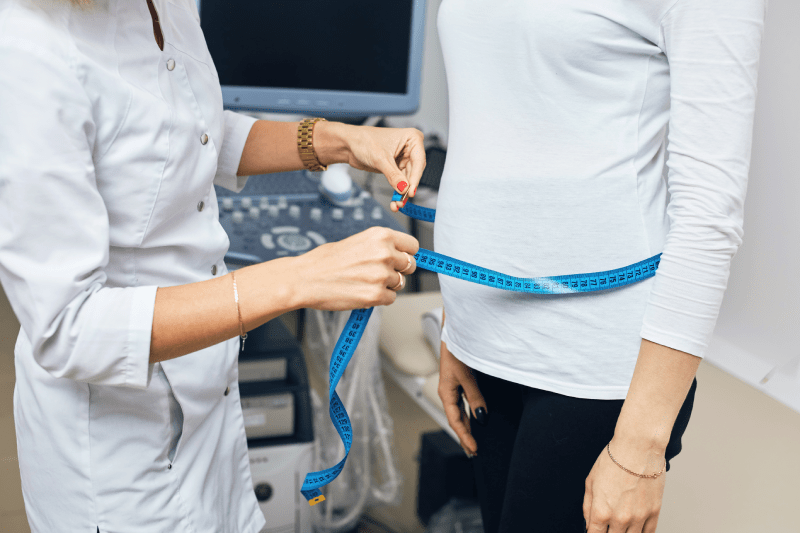What Is Mini Gastric Bypass Surgery And How Is It Performed?
Mini Gastric Bypass (MGB) or single anastomosis bypass is a bariatric surgery method that reduces the stomach in the shape of a tube and restricts absorption by bypassing a longer section of the small intestine. The most important difference from standard Gastric Bypass is that the intestinal connection (anastomosis) is made at only one point, which technically makes the procedure simpler and shorter in duration.
In this operation performed with the laparoscopic (closed) method, a small stomach pouch is created, and a section of the small intestine, approximately 150-200 cm long, is bypassed and connected to this pouch. This dual action mechanism triggers effective weight loss by providing a rapid feeling of satiety and a reduction in calorie absorption.
How Do Kusadasi Mini Gastric Bypass Prices Vary?
Mini Gastric Bypass surgery prices in Kusadasi vary depending on some fundamental factors. The technological equipment provided by the hospital where the surgery will be performed and whether it has international accreditations are important. The experience and expertise of the surgeon in this field also directly affect the prices. Additionally, it is necessary to evaluate the scope of extra services included in the price; these services may include detailed pre-operative tests, hospital stay (usually 4-5 days), anesthesia, medications, and post-operative nutritional counseling. All-inclusive packages offered for international patients aim to provide transparent pricing.
What Are The Body Mass Index (BMI) Requirements For MGB Surgery?
The Body Mass Index (BMI) requirements for Mini Gastric Bypass surgery are compatible with general bariatric surgery criteria. This procedure is generally suitable for individuals with a BMI of 40 or higher. Furthermore, patients with a BMI between 35 and 40 but with serious co-morbidities related to obesity, such as type 2 diabetes, severe reflux, or sleep apnea, may also be candidates. Every patient is comprehensively evaluated by a multi-disciplinary team (surgeon, dietitian, psychologist) before the surgery. This evaluation is vital for determining the patient’s most suitable and safe treatment path.
How Much Weight Loss Should Be Expected With Mini Gastric Bypass?
The expected weight loss rate after MGB surgery is one of the highest levels in bariatric surgery. Patients can succeed in losing 70% to 85% of their excess weight within the first 1 to 2 years after the surgery. This high success rate is possible thanks to both the restriction on consumption brought by the small stomach pouch and the reduction in calorie and nutrient absorption provided by the intestinal bypass. Maintaining weight loss in the long term depends on the patient’s lifelong adherence to the nutrition program and regular physical activity.
What Role Does MGB Surgery Play In The Treatment Of Type 2 Diabetes?
Mini Gastric Bypass is known to provide extraordinary improvement in type 2 diabetes patients. The food reaching the lower part of the small intestine after surgery rapidly increases the secretion of metabolism-regulating hormones (e.g., GLP-1) from this area. This hormonal change breaks insulin resistance in a short time, causing most patients to reduce or completely eliminate their need for diabetes medications immediately after the surgery or within a short period. MGB is considered a powerful treatment tool for obese patients with diabetes due to this metabolic effect.
What Is The Duration Of The Hospital Stay After Surgery?
The duration of hospital stay after Mini Gastric Bypass surgery is generally between 4 and 5 days, as the procedure is performed laparoscopically and is less complex than standard bypass. During this critical period, the surgical team closely monitors the patient’s vital signs, performs necessary checks for early diagnosis of possible complications, and observes the patient’s smooth transition to liquid intake. Modern clinics in Kusadasi offer special patient care services for patients to have a comfortable recovery process.
Why Should Kusadasi Be Preferred For MGB Surgery?
Kusadasi is an ideal place that combines the advantages of health and tourism for Mini Gastric Bypass surgery. High-standard services offered by experienced surgeons in internationally accredited hospitals are much more affordable compared to other European countries. Additionally, spending the post-operative recovery period in the peaceful and sunny atmosphere of the Aegean Sea positively affects the patients’ morale and psychological recovery. Health tourism organizations like Cure Holiday facilitate the process by providing accommodation and transfer including all logistics.
What Are The Possible Risks And Complications Of Mini Gastric Bypass?
Mini Gastric Bypass carries surgical risks like other bariatric surgeries, but having a single connection theoretically reduces the risk of anastomotic leakage. The basic risks include lifelong vitamin and mineral deficiencies caused by malabsorption. Furthermore, bile reflux, marginal ulcer formation, and rarely, intestinal obstructions may be seen. It is vital for the patient to comply with all pre-operative instructions and not neglect long-term follow-up to minimize these risks.

How Often Is Dumping Syndrome Seen After MGB And How Is It Prevented?
Dumping syndrome is a condition quite commonly seen after Mini Gastric Bypass surgery and usually arises from improper eating habits. This syndrome is triggered when foods, especially high-sugar and fatty ones, rapidly pass from the small stomach pouch to the small intestine. Symptoms can include palpitations, sweating, stomach cramps, and diarrhea. To prevent it, patients must adhere to lifelong rules of eating slowly, separating solid and liquid foods, and strictly avoiding refined sugary contents.
Does MGB Surgery Offer A Definite And Permanent Solution?
Mini Gastric Bypass surgery is a very powerful tool for managing excessive weight, but it does not provide a guarantee of a permanent solution on its own. The surgery creates physiological and hormonal changes in the body that initiate and facilitate weight loss. However, the risk of weight regain is always present if the patient returns to old eating habits or continuously strains the small stomach pouch. Permanence is possible with the patient’s discipline of completely changing their lifestyle, regular exercise, and long-term follow-up lasting many years.
What Expert Consultations And Tests Are Required Before Surgery?
Before MGB surgery, it is mandatory to obtain comprehensive tests and expert opinions to ensure the patient’s suitability and safety for the surgery. These include evaluations by cardiology, anesthesia, internal medicine, and endocrinology specialists. Additionally, psychiatry/psychologist consultation is essential to evaluate the patient’s psychological resilience and ability to adapt to the lifestyle change. The tests performed include endoscopy, abdominal ultrasound, chest X-rays, and detailed blood tests.
Which Nutritional Supplements Must Be Used For Life After Surgery?
After Mini Gastric Bypass surgery, lifelong nutritional supplementation is mandatory due to the bypass of a portion of the intestine. Since there can be a serious decrease in the absorption of Iron, Vitamin B12, Folic Acid, Calcium, and Vitamin D, these supplements must be taken in high doses. It is a vital necessity for the patient’s long-term health to track deficiency levels with regular blood tests and use the special bariatric multivitamins recommended by the doctor without fail.
What Are The Contents Of Kusadasi Surgery Packages?
Mini Gastric Bypass surgery packages in Kusadasi have a comprehensive and all-inclusive structure for international patients. Typically, these packages include the cost of the surgical fee, 4-5 days of hospital accommodation, anesthesia, all mandatory pre-operative medical tests, and surgical materials used. Additionally, airport (ADB) transfers, interpreter support, and first-year dietitian/surgeon follow-up after the surgery are also integral parts of these packages.
How Is Expected Pain Managed After Surgery?
Since Mini Gastric Bypass is performed with the laparoscopic method, the pain felt after the surgery is generally lighter than open surgery. During the hospital stay, pain is effectively controlled with strong painkillers given intravenously (IV) and orally. The most intense pain is felt within the first 24-48 hours and quickly subsides. Shoulder pain caused by gas bloating is common; early and regular walks are strongly recommended to alleviate this pain. Oral medications provided after discharge usually provide sufficient relief.
Why Is The Importance Of Long-Term Follow-Up Critical In Mini Gastric Bypass?
Long-term follow-up is of very critical importance in MGB surgery because the malabsorption mechanism carries the risk of lifelong vitamin and mineral deficiencies. Regular check-ups and blood tests by the dietitian and surgeon are vital for the early detection and correction of these deficiencies. Furthermore, follow-up meetings help prevent the patient from deviating from nutritional rules and reduce the risk of weight regain, ensuring the continuation of the surgery’s long-term success.
How Should Eating Habits Change After Surgery?
Eating habits after surgery undergo a radical change that the patient must adopt for life. The basic rules are to consume very small portions, chew every bite slowly and well for at least 20 times, and strictly separate the consumption of solid foods and liquids (no liquid consumption 30 minutes before and after meals). Compliance with these rules both prevents dumping syndrome and ensures the protection of the new stomach pouch. Protein intake should always be prioritized to prevent muscle loss and hair loss.
What Is The Effect Of MGB Surgery On Reflux And Heartburn?
Mini Gastric Bypass may carry the risk of bile reflux (return to the stomach) in some patients, although it is less likely than typical Gastric Bypass. However, in most patients with chronic gastroesophageal reflux disease (GERD) related to obesity, a marked improvement in reflux symptoms is seen due to weight loss and the direct flow of stomach acid into the intestine. Therefore, when making the surgery decision, the patient’s reflux status should be evaluated in detail, and the most appropriate surgical method should be determined based on this risk.

How Are Accommodation And Airport Transfer Provided In Kusadasi?
The accommodation and transfer needs of international patients coming to Kusadasi for Mini Gastric Bypass surgery are usually met by health tourism intermediary organizations like Cure Holiday, included in the surgery package. This ensures patients are transported from Izmir Adnan Menderes Airport (ADB) to the hospital and the recovery period hotel in Kusadasi with comfortable, private vehicles. Luxury or boutique hotels suitable for rest near the hospital are offered as accommodation options. These services reduce the patient’s stress and allow them to focus entirely on recovery.
When Should Physical Activity Begin After Surgery?
The process of starting physical activity after Mini Gastric Bypass is gradual. Most patients are encouraged to take short walks a few hours after the surgery; this is vital for reducing the risk of blood clots. Light-paced walking can usually be started within the first week. However, heavy lifting, intense running, or exercises that strain the abdominal muscles must be strictly avoided for the first 6 weeks to allow the abdominal incisions to fully heal and prevent the risk of hernia. With doctor’s approval, swimming and light weight training can be slowly resumed after 6 weeks.
Is There An Age Limit For Mini Gastric Bypass?
The general age range for Mini Gastric Bypass surgery is accepted as 18 to 65. However, in bariatric surgery, metabolic age is more important than chronological age. Special conditions (growth and development and parental consent) are required for patients under 18, while for patients over 65, their suitability for anesthesia is meticulously examined through comprehensive cardiac and pulmonary (lung) evaluations. The final decision is made individually based on the patient’s general health status and ability to withstand surgical stress.
What Foods Are Absolutely Forbidden After Surgery?
Foods that are absolutely forbidden after Mini Gastric Bypass primarily include sugar and sugary contents (sweets, ice cream, sugary fruit juices) because they trigger dumping syndrome. Other forbidden items include carbonated and acidic drinks (they can expand and irritate the stomach), dry and fibrous meats not chewed adequately (they can cause blockage), and high glycemic index, pouch-filling foods like white bread, rice, and pasta. Alcohol consumption is also generally strictly forbidden or severely restricted during and after the recovery period.
How Is The Risk Of Weight Regain Reduced After MGB?
The fundamental way to reduce the risk of weight regain after Mini Gastric Bypass is a disciplined lifestyle. First, adhere to lifelong nutritional supplements and the protein target. Second, make regular physical activity (at least 150 minutes of walking per week) a life routine. Third, continue to receive psychological follow-up to manage emotional eating triggers. One of the most critical points is to protect the stomach pouch by eating slowly and separating liquids and solids and avoiding liquid sugar consumption.
When Can One Get Pregnant After Surgery?
Getting pregnant after Mini Gastric Bypass surgery is possible, and weight loss can increase the chance of conception by resolving infertility issues related to obesity. However, for the health of the mother and baby, getting pregnant during the first 12 to 18 months after the surgery is definitely not recommended. Since the body experiences rapid weight loss and the risk of nutritional deficiency is high during this period, pregnancy should be planned after body weight stabilizes and doctor’s approval is obtained, accompanied by intensive vitamin supplements.
What Are The Hospital And Clinic Standards In Kusadasi?
Hospitals in Kusadasi offering Mini Gastric Bypass services generally operate in compliance with international health and surgical standards. Most facilities aim to meet the high quality and safety criteria set by the Ministry of Health of the Republic of Turkey and international accreditation organizations (JCI). Hospitals are equipped with advanced laparoscopic equipment and a fully equipped intensive care unit. The national and international training of the surgical teams performing the operations ensures the continuation of these high standards.
What Is The Total Duration Of The Surgery?
The Mini Gastric Bypass surgery itself is shorter than the standard Gastric Bypass. When performed laparoscopically, the duration of the operation varies between an average of 90 and 150 minutes. This shorter duration is due to the second intestinal connection required in standard bypass not being necessary. This time does not include the patient’s preparation for anesthesia and the post-operative waking process. The surgeon’s experience and the patient’s anatomical structure are key factors affecting the exact duration of the surgery.
Is Hair Loss Normal After Surgery And How Is It Prevented?
Yes, hair loss is a common and temporary condition after Mini Gastric Bypass surgery. This is associated with a stress response the body gives to rapid weight loss and changes in the absorption of nutrients such as protein, iron, and zinc. The loss usually begins 3 to 6 months later. To prevent it, patients must reach the adequate protein target and strictly use the Biotin, Zinc, and other vitamin supplements recommended by the doctor. The loss generally stops after the body finds its balance.
Is MGB Surgery Covered By Insurance?
Mini Gastric Bypass surgery is not covered by most health tourism packages for foreign patients in Turkey and is paid directly by the patients. Most patients coming from abroad prefer special package prices because their private insurance in their own country does not cover aesthetic or obesity surgery. However, if the patient’s private insurance in their own country covers bariatric surgery, there might be a possibility of requesting partial reimbursement for the operation in Turkey. Direct communication with the clinic provides the most accurate information.
How Does The Dietitian Follow-Up Process Work In Kusadasi?
The dietitian follow-up process for patients who undergo surgery in Kusadasi plays a key role in the success of MGB. This follow-up, which starts face-to-face, continues intensively remotely (online/video consultation) after the patient returns to their country. The dietitian guides the patient through every nutritional phase (liquid, puree, soft), monitors protein goals and strategies for preventing dumping syndrome. This continuous support is vital for the patient to make lifelong healthy eating habits permanent.
Why Do Nausea And Vomiting Occur After Surgery?
Nausea and vomiting are common in the early period after surgery, but this condition is usually temporary. The reasons for nausea can be the reaction to anesthesia, adaptation to the reduction of the stomach pouch, or gas bloating. Vomiting is mostly caused by the patient eating too fast, chewing insufficiently, or trying to consume an amount of food that exceeds the new stomach capacity. Anti-nausea medications are used in the hospital, and the patient’s compliance with the rule of eating slowly prevents the symptoms.
When Does Skin Sagging Emerge After Surgery?
Skin sagging begins to become evident generally from 6 months to 1 year after Mini Gastric Bypass due to rapid and large amounts of weight loss. The severity of the sagging depends on the patient’s age, genetic skin elasticity, and the total amount of weight lost. To minimize sagging, high protein intake, adequate hydration, and regular weight/resistance exercises that preserve muscle mass are recommended. In cases of severe sagging, the patient may consider body contouring surgeries at a second stage.

What Are The Benefits Of The Surgery For Heart And Vascular Health?
Mini Gastric Bypass surgery creates very rapid and positive effects on heart and vascular diseases related to obesity. Rapid weight loss after surgery quickly corrects high blood pressure (hypertension) and cholesterol levels. These improvements significantly reduce the risk of heart attack and stroke by lessening the load on the heart and decreasing the risk of hardening of the arteries. Many patients reduce or completely discontinue their need for heart medications after the surgery.
How Long Can Fatigue And Weakness Last After Surgery?
Fatigue and weakness are normal in the first few weeks after surgery and can last for a few weeks. This condition is related to the body recovering from a major surgery, adapting to low-calorie intake, and rapid weight loss. In MGB, this weakness may last longer due to the decreased absorption of vitamins such as B12 and iron. To reduce weakness, adequate fluid and protein intake and not skipping the supplements recommended by the doctor are of vital importance.
Is A Liver-Shrinking Diet Mandatory Before Surgery?
Yes, in most bariatric centers, a liver-shrinking pre-diet is mandatory before Mini Gastric Bypass surgery. This special diet (usually liquid/protein focused) shrinks the size of the liver, ensuring the surgery is safer and technically easier to perform. The shrinking of the liver opens up the surgical field, reducing the risk of complications. Furthermore, this pre-diet also helps prepare the patient for the post-operative nutritional discipline.
How Is Possible Iron Deficiency Prevented After MGB?
The risk of iron deficiency is high after Mini Gastric Bypass as it affects iron absorption. To prevent deficiency, patients must have regular blood tests for life and use high-dose iron supplements recommended by the doctor. To increase the absorption of iron supplements, it is recommended to take them together with something containing Vitamin C and be careful to take them separately from calcium supplements. In cases of severe deficiency, intravenous iron administration may be necessary.
What Are The Metabolic And Hormonal Benefits Of MGB?
Mini Gastric Bypass offers extensive metabolic and hormonal benefits besides weight loss. In addition to the rapid improvement of type 2 diabetes, the surgery significantly corrects sleep apnea, obesity-related asthma, and Polycystic Ovary Syndrome (PCOS) symptoms. Hormonally, it facilitates appetite control by increasing satiety hormones secreted from the intestine and suppressing the appetite hormone (ghrelin). These benefits fundamentally improve the patient’s overall health quality.
How Quickly Can The Capacity Of The New Stomach Pouch Expand?
The small stomach pouch created with Mini Gastric Bypass initially has a capacity of approximately 30 to 50 milliliters. This capacity may expand slightly over time if the patient maintains unhealthy eating habits (eating fast, overfilling). Since the expansion of the pouch significantly increases the risk of weight regain, it is vital for the patient to adhere to the rules of eating slowly, chewing well, and portion control for life to keep the pouch small and sustain success.
What Is The Best Timing For Surgery In Kusadasi?
Mini Gastric Bypass surgery can be performed safely in any season of the year. However, for those planning to have surgery in Kusadasi, spring (April-May) and autumn (September-October) are recommended as the most suitable times for comfort during recovery and rest. These periods allow you to avoid the intense summer heat and crowds, enabling you to take the recommended walks after surgery in a more comfortable and enjoyable Aegean atmosphere.
Is Mini Gastric Bypass More Difficult Than Gastric Sleeve?
Mini Gastric Bypass is technically considered more complex than gastric sleeve surgery because both the stomach is reduced and a single intestinal connection (bypass) is made. Gastric sleeve is only a stomach reduction procedure. However, the operation duration is shorter due to MGB being simpler than standard Gastric Bypass (single anastomosis). The choice of surgical team and hospital is determinant for managing this complexity and ensuring surgical safety.
How Long Should Psychological Follow-Up Last After Surgery?
Psychological follow-up after Mini Gastric Bypass should continue regularly for at least 1 year to support the patient’s adaptation to the new lifestyle. Because obesity is closely related to emotional eating habits, support from a psychologist or psychiatrist is mandatory for the patient to maintain weight loss motivation, cope with body image changes, and manage possible fear of weight regain. Clinics provide this follow-up to international patients through online methods.
How Can Weight Loss Be Accelerated After Surgery?
The key to accelerating the weight loss process after surgery is unwavering compliance with surgical rules. First, maintain high protein intake. Second, maximize daily water consumption (at least 2-3 liters). Third, start with early walking and add resistance (weight) training to the routine after 6 weeks. Resistance training prevents metabolism from slowing down by preserving muscle mass. Adhering to the rule of separating liquids and solids ensures the efficient function of the stomach pouch.
Are Special Corsets Or Garments Required After Surgery?
Generally, a ** special corset** is not mandatory after Mini Gastric Bypass surgery, but some surgeons may recommend wearing a light abdominal band or corset for the first few weeks to reduce bloating and discomfort in the abdominal area. This provides comfort and support especially in the early recovery period. It is advised that patients wear loose and comfortable cotton clothing that will not constrict the abdominal area after discharge, for the comfort of the incision sites.
These detailed questions and answers provide you with a comprehensive roadmap about Mini Gastric Bypass surgery and the pricing process in Kusadasi. To take this important health decision under the most reliable conditions and with a personalized treatment plan, you can confidently contact Cure Holiday. They will be happy to assist you in preparing your special treatment plan and starting a healthy and new life journey in Kusadasi.



